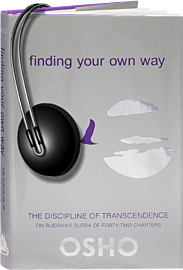The Discipline of Transcendence
This is the first of four volumes in which Osho comments on the 42 earliest-known teachings of Buddha. Here is Buddha alive, relevant, scientific in insight, and very human.
Using Buddha’s Words…
Using Buddha′s wisdom as a springboard, Osho brings to life words that have the power to change the way we see the world, change the way we see religion, and above all, change the way we are. Far from being just a statue, here Buddha is an amazing human being so far ahead of his time that even now he is only just beginning to be more widely understood.
FINDING YOUR OWN WAY NEDERLANDS
Dit boek is het eerste deel van de serie herdrukken van de Osho klassieker “The discipline of Transcendence”. Centraal staan de eerste 42 werken van Boeddha,
voor zover ze ons bekend zijn. Boeddha wordt door Osho afgeschilderd als springlevend, relevant, wetenschappelijk van inzicht en zeer menselijk. In “Finding your own way” gebruikt Osho Boeddha’s wijsheid als springplank en hij brengt zijn woorden tot leven omdat zij de kracht hebben om mensen anders naar de wereld te laten kijken. Religie wordt aan de hand van de visie van Boeddha anders bekeken en ook de manier om onszelf te beschouwen.
way” gebruikt Osho Boeddha’s wijsheid als springplank en hij brengt zijn woorden tot leven omdat zij de kracht hebben om mensen anders naar de wereld te laten kijken. Religie wordt aan de hand van de visie van Boeddha anders bekeken en ook de manier om onszelf te beschouwen.
Boeddha’s inzichten stijgen ver uit boven zomaar een decoratief beeld in huis of tuin te zijn. Hij is een heel bijzonder wezen die zijn tijd ver vooruit was. Zijn benadering wordt pas in onze tijd op grotere schaal begrepen.
Osho benadrukt het belang van een direct contact tussen het individu en het Bestaan, wat een kenmerk van ‘being religious’ is. En zijn werk is erop gericht, zo betoogt hij, om alle hindernissen die door conditionering ontstaan zijn te slechten.
Het boek Finding Your Own Way is verkrijgbaar in de Boekhandel en via internet.
Impressie van Finding Your Own Way
Excerpt from Finding Your Own Way
Chapter 1
You need not be a religious person to be convinced by Buddha, that’s his rarity. You need not believe at all. You need not believe in God, you need not believe in the soul, you need not believe in anything – still you can be with Buddha, and by and by you will come to know about the soul and about God also. But those are not hypotheses.
But those are not hypotheses.
No belief is required to travel with Buddha. You can come with all skepticism possible. He accepts, he welcomes, and he says, “Come with me.” First he convinces your mind, and once your mind is convinced and you start traveling with him, by and by you start feeling that he has a message which is beyond mind, he has a message which no reason can confine. But first he convinces your reason.
Buddha’s religion is suprarational, but not against reason. This has to be understood in the very beginning. It has something to do with the beyond: suprarational, but that suprarational is not against the rational. It is in tune with it. The rational and the suprarational are a continuity, continuous. This is the rarity of Buddha.
Krishna says to Arjuna, “Surrender to me.” Buddha never says that. He convinces you to surrender. Krishna says, “Surrender to me, then you will be convinced.” Buddha says, “Be convinced first, then surrender comes like a shadow. You need not worry about it, don’t talk about it at all.”
Because of this rational approach he never brings any concept which cannot be proved. He never talks about God. H. G. Wells has said about Buddha, “He is the most godly and the most godless man in the whole history of man.” Yes, it is so – the most godly and the most godless.
You cannot find a more godly person than Buddha. Every other personality simply fades before him. His luminosity is superb, his being has no comparison, but he does not talk about God.
Because he has never talked about God, many think that he is an atheist – he is not. He has not talked about God because there is no way to talk about God. All talk about God is nonsense. Whatsoever you can say about God is going to be false. It is something that cannot be said.
Consciousness is Individual
“Consciousness is individual, unconsciousness is universal; superconscious is universal, consciousness is individual. So if somewhere in Africa or somewhere else they are teaching you to be part of the group, you will become unconscious. The greater possibility is that you will fall from your consciousness. Unless you become a Buddha, you cannot become one, you cannot know the real oneness with the whole.
“The real oneness of the whole can be known only in two ways: either become unconscious, lose your consciousness – individuality is lost; or go beyond consciousness – then your individuality is lost.
“That’s why a crowd has so much appeal for people. Have you seen people in a crowd, how happy they look? …
Why do feel people so happy in the Crowd?
“Why do people feel so happy in a crowd? Why does happiness in a crowd become so infectious? Because in a crowd they fall down, they become unconscious. They lose their individuality, they merge their individuality. By dropping their consciousness they drop their individuality. Then they are happy, then there is no worry, then there is no responsibility.
